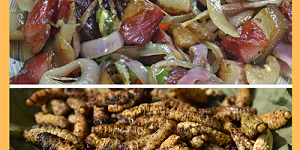There are genuinely sufficient resources in the world to ensure that no one, nowhere, at no time, should go hungry- Ed Asner
#WorldFoodDay #Grow #Nourish #Sustain. #TogetherOurActionsAreOurFuture.
When we talk about food, we also talk about health. These two words go in hand and in fact, they are like two sides of a coin, Food is what’s keeping living creatures alive. Let me rephrase that, healthy and organic food is what keeps us alive. We live for food, we study and work so that we can afford food. Food has also been one the of medium for love affairs, the world in fact revolves around food. So, what do we do since we love food so much? We celebrate food and we celebrate it on the 16th of October annually as world food day.
North East Network is dedicated to its mission of protecting the environment and biodiversity through initiatives by engaging youth and women. On this note, the staff of North East Network Meghalaya had organized a small program on setting up of a Kitchen garden in the office premises as part of the pre-World Food Day Celebration with the intention of harvesting abundant supplies of fresh and organic vegetables.
The program kick-started with an activity that requires each staff to come up with a one-liner about their favorite vegetable or fruit followed by a discussion on the various indigenous food crops that have come to the verge of extinction and approaches to promote and revive them. The discussion brought to light that Meghalaya has about 140 different rice species but unfortunately data has now degraded to only 14.
The staff planted varieties of local vegetables namely coriander, mustard, radish, long beans, lettuce, beetroot, and turnip. Following that day, the staff also decided to prepare lunch in the office kitchen with a variety of local indigenous cuisines.
Phidarilin Uriah, a Programme Associate at NEN, who has an enormous amount of knowledge on indigenous seeds and plants took us through the importance of promoting local crops, foraging wild edible plants that are part of our culture, and planting one’s own food for a rewarding healthy lifestyle. Interestingly, during the process of planting these seeds, some of the staff started talking to the seeds saying that it is a cultural practice followed by generations that will enable the plants to nourish and flourish abundantly. It is important that we learn to imbibe and appreciate local slow food cuisine which has always been underrated in comparison to the fast food that is easily accessible in the market. This will help us retain our food culture and also live a healthier chemical-free life.
The program was overall a successful one as the staff learned from one another the various indigenous food crops that are on the verge of extinction through discussion and learning the various techniques on planting and cooking of local food. The program taught the staff members to appreciate local organic indigenous slow food more than before and conservation of culture as local food is greatly linked to traditional habits of eating.
The joy of harvesting one’s own produce is a feeling that not only fulfills the soul but also nourishment for the body free of all hazardous chemicals. The process might be slow but the harvest manifolds our overall well being.
The whole concept of a kitchen garden is quite interesting actually. It’s healthy and also helps save our pinching pocket especially in times like these. A kitchen garden can help sustain a healthier lifestyle and promotes local fresh out of the garden produce with no possible harm to our health. Planting these seeds in the garden helped us understand the love and care that these vegetables need in order to grow to their full potential. promoting a kitchen garden will and can only benefit non but the human race and an activity like this will eventually help survive this world filled with pollutants















